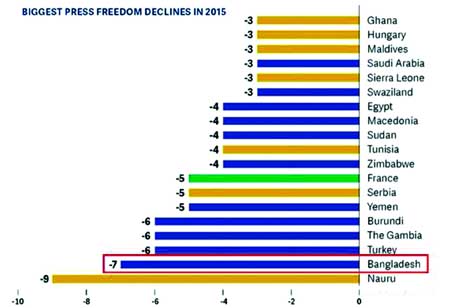
newsnextbd .com :
A global research organisation has said press freedom in Bangladesh was hampered extensively because of the intimidation from both state and non-state factors, including suspected Islamist militants, in the Muslim-majority South Asian country.
The Freedom House, a pro-democracy group, in its annual Global Press Freedom report 2015 downturned Bangladesh from its “party free” status to “not free” status. Continued legal harassment of media outlets and press freedom advocates, government-imposed economic pressure on certain outlets and attempt to censor social media on the on hand and murders of bloggers and a publisher by Islamist militants, threats and nonfatal attacks against other writers have made the country’s status downgraded. The annual report said Bangladesh is among the countries that experienced the largest decline in regards to freedom of expression in the year.
Turkey, Burundi, France, Serbia, Yemen, Egypt, Macedonia, and Zimbabwe are substantially suffered the decline status after Bangladesh in terms of media freedom. Bangladesh’s media atmosphere faced major setbacks in 2015, said the survey adding that the year was substantiated by fatally attacks against bloggers and a spate of politically motivated legal cases against journalists.
Growing concerns over state censorship-including of internet-based content-also had a chilling effect on freedom of expression, the report pointed out. At least four bloggers and a publisher were killed by extremists in Bangladesh in 2014. The bloggers had produced content which was critical of religious fundamentalism, the report mentioned. Many other writers are being threatened and injured in similar attacks regularly, the report said. The writers also felt compelled to go silent, relocate, or flee away the country in fear of it.
The authorities temporarily blocked social media sites on security grounds, allegedly forced the suspension of a popular political talk show, the research said. They threatened dozens of people with contempt of court charges for signing a letter in support of a British journalist who had been convicted on similar charges in late 2014.
The government also reportedly put high pressures on private companies to withdraw advertising from two critical newspapers.

